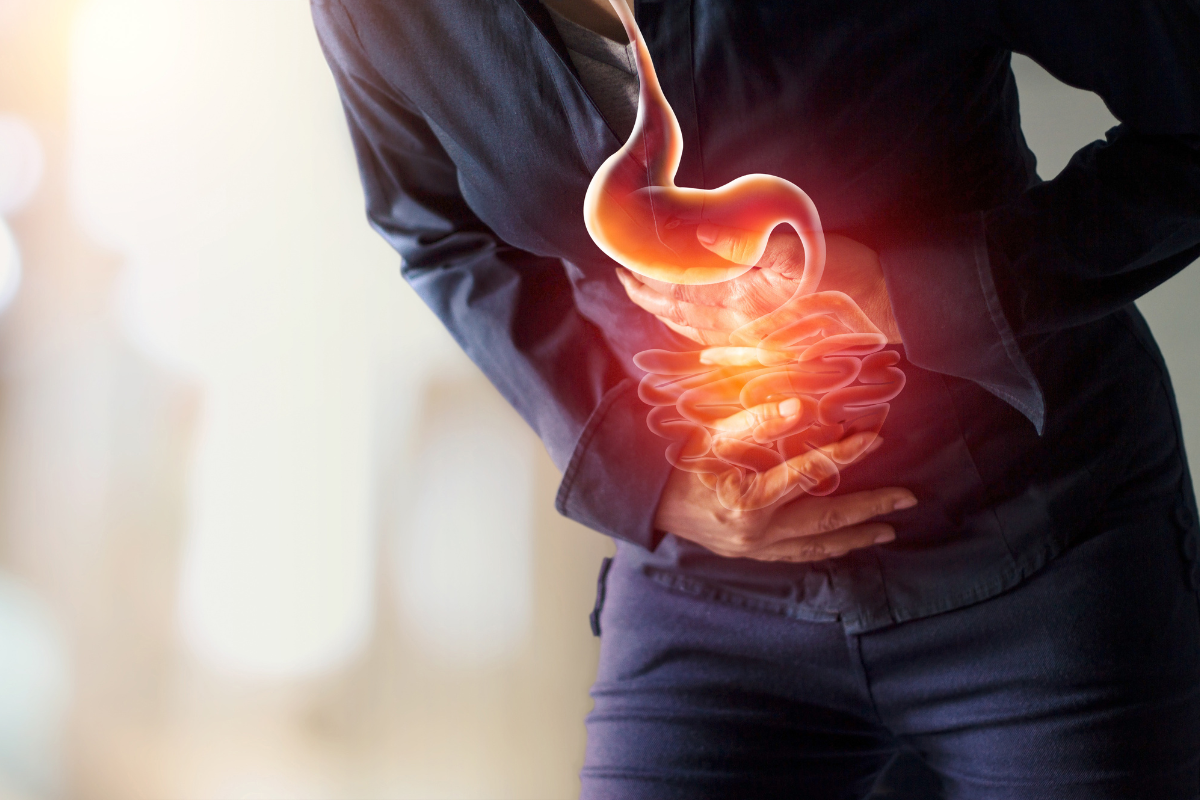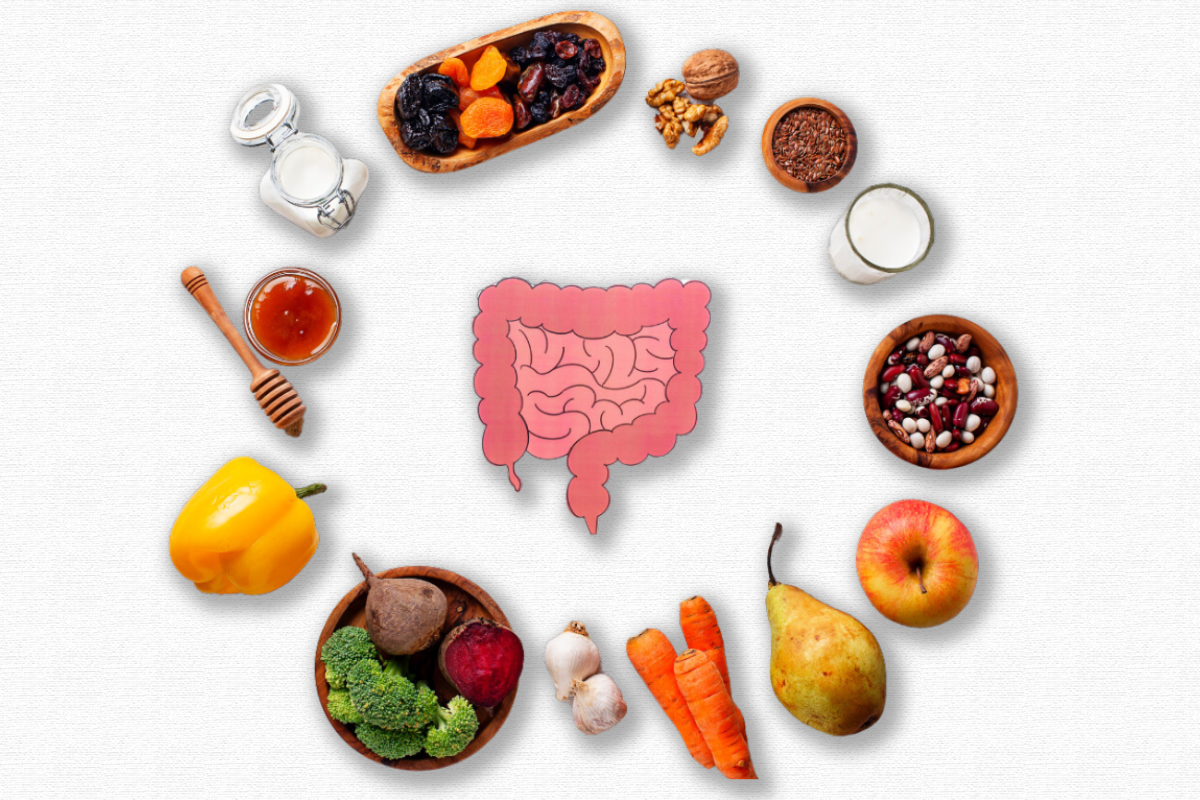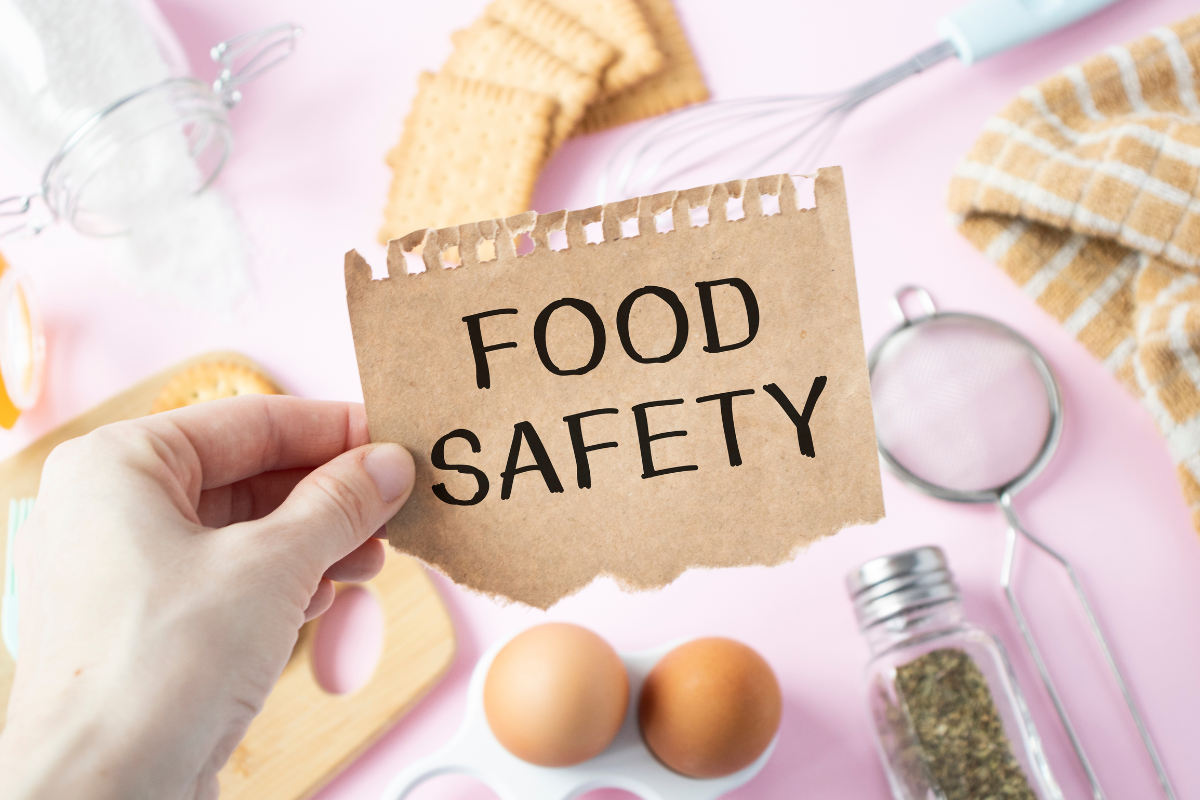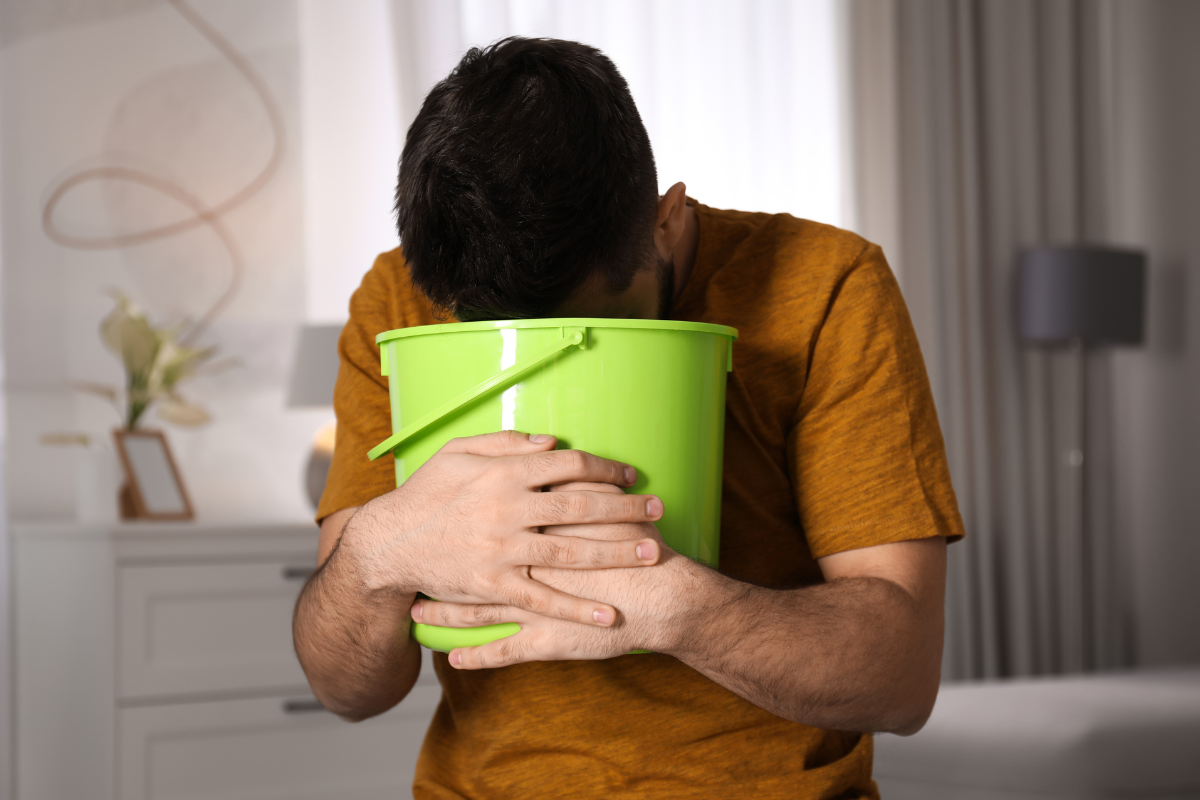
When you can’t leave the bathroom because of tummy troubles, you might not care much about what’s making you sick. You just want to feel better! But knowing if you have the stomach flu or food poisoning can at least help you avoid it in the future.
While norovirus, the most common cause of stomach flu, is most common in November through April, it circulates all year. And since food poisoning happens more often during the hot summer months, it’s hard to know which one you’re suffering from.
So, what are the symptoms of stomach flu or food poisoning? And how do you treat them? Most importantly, you’ll want to know how to protect yourself and your family from these pesky illnesses.
First, What Causes Stomach Flu or Food Poisoning?
Although many people call it stomach flu (or stomach bug), it has no relation to the actual flu (influenza). The technical name for this type of tummy trouble is gastroenteritis.
The two most common viral causes are norovirus in adults and rotavirus in children. Both are highly contagious, but fortunately, there is a rotavirus vaccine for vulnerable infants.
Neither of these viruses is typically life-threatening on its own. However, without proper care, they can quickly lead to dehydration, especially in infants and older adults, which can cause severe and potentially deadly problems.
Other causes of gastrointestinal distress are bacterial, parasitic, or, less commonly, toxic due to exposure to chemicals.
When sickness-inducing bacteria or parasites are ingested with foods or drinks, that’s food poisoning.
Occasionally, food poisoning occurs because of contamination or improper food processing methods from packaged goods and produce. But more often than not, it happens because of unsafe food handling.

Is it stomach flu or food poisoning? How can you tell?
Are Your Symptoms from Stomach Flu or Food Poisoning?
These two illnesses have very similar symptoms. Uncovering whether you have stomach flu or food poisoning can be difficult.
Common symptoms for both of these include:
- Nausea and vomiting
- Diarrhea
- Abdominal cramps
- Temporary anorexia (an inability or lack of desire to eat)
- Fever
However, there are several ways to tell the difference between them.
How did your symptoms start?
Stomach flu typically comes on gradually. You’ll usually start to feel like you’re coming down with something before the major symptoms begin.
Food poisoning happens fast. You’ll feel fine, and then you’re running to the bathroom.
How long do your symptoms last?
Because stomach flu and food poisoning may only last 24-48 hours, this question may not solve which one you have. However, stomach flu can last up to a week, especially with the run-down, sick feeling you get with viral infections. Food poisoning should resolve completely within two to three days.
Do you have other symptoms?
Obviously, consistent vomiting and diarrhea from food poisoning will cause you to feel exhausted and weak. However, you probably won’t experience any other symptoms. And again, all of these will resolve when your digestive system recovers.
With stomach flu, you can also have a cough or runny nose, severe fatigue, headaches, and body aches, and these can last for days after your vomiting and diarrhea end.
Is anybody else sick?
The stomach flu can wreak havoc on a household, school, office, or community since it’s highly contagious.
You’ll know it’s food poisoning if the only other sufferers ate the same thing you did before the symptoms started.

How to Prevent Tummy Troubles
On top of making you feel awful, the stomach flu and food poisoning can keep you from doing things you need to do.
You’ll miss school or work, miss out on social opportunities, and probably find it challenging to take care of your household, at least for a day or two.
The best thing you can do is avoid getting sick as much as possible.
Preventing Stomach Flu
Since the pandemic, we’re all more educated than ever before about how to avoid viral infections. If you know how to stay healthy from one virus, that applies to them all.
In case you need a refresher, those rules include:
- Avoid touching your face, and wash your hands frequently, especially in or after being in public places.
- Maintain distance from strangers and people who exhibit symptoms of being unwell.
- If you are particularly vulnerable, wear a mask in public.
You can also take steps to reduce illness in your home.
First and foremost, if you’re sick, stay home. Try to quarantine yourself from your family members as much as you can. This helps reduce the spread of the stomach flu in your home and your communities.
Frequently clean high-touch areas, such as faucet handles, doorknobs, and countertops. You can use antibacterial and antiviral wipes, sprays, or just soap, water, and a clean rag. Friction is very important for removing microbes from surfaces, including your skin.
Finally, you can boost your immune system with a well-balanced diet and, if necessary, supplements. When your body’s defenses are stronger, you’ll have an easier time fighting off the viruses and other invaders you might be unintentionally exposed to. Probiotic-rich foods and supplements also help your digestive system stay stronger by keeping high levels of healthy bacteria.

When you eat a balanced diet of healthy foods and probiotics, your gut has an easier time fighting off viral and bacterial invaders.
Food Safety Rules to Prevent Food Poisoning
Despite how preventable food-borne illness is, the CDC reports that 1 out of 6 people in the U.S. get food poisoning yearly.
While you can’t control how safely processed foods are packaged, there are many steps you can take to keep you and your family safe from food poisoning.
During Food Preparation
- Keep everything clean — Handwashing, both before and during food handling, helps reduce the spread of germs and bacteria. Likewise, wipe down and sanitize surfaces, utensils, and cutting boards between different foods and after cooking.
- Rinse produce — Thoroughly clean fruits and vegetables under warm running water to reduce microorganisms. This action also helps remove preservatives and other substances that keep produce fresh. (But don’t wash your chicken or other meats! It actually increases the risk of accidental exposure to food-borne illness-causing bacteria.)
- Keep things separate — Avoid cross-contamination by keeping meats and their juices separate from each other and other foods. Use different cutting boards and utensils for meat and produce or thoroughly sanitize them between uses.
Cooking
- Check for doneness — Cooking to the right temperature often guarantees you’ll kill harmful bacteria. Use a food-grade thermometer to check the internal temperatures of your cooked foods based on a food temperature chart.
- Safely reheat leftovers — Even when chilled correctly, bacteria growth can still happen. Reheating food to an appropriate internal temperature reduces your risk of getting sick.
- Don’t consume raw or undercooked meat, eggs, flour, or unpasteurized dairy products — As enticing as cookie dough is, don’t eat it! Both raw eggs and flour contain bacteria. And eating any undercooked or raw meats and eggs and unpasteurized dairy carries a risk of food poisoning.
Storage
- Store quickly and coldly — The longer food sits out, the more opportunity bacteria have to grow. Cold temperatures significantly slow this process. So the sooner you refrigerate or freeze foods, the better.
- Be smart with leftovers — As disappointing as it is to throw out food you’ve spent time cooking, eating old leftovers isn’t worth the risk. You should consume most prepared food within 3-4 days. (This comprehensive list shows how long you can safely store different foods.)
- Store foods properly — Using leak-proof, airtight containers helps reduce bacterial growth and prevents cross-contamination. For resealable packages, make sure they are completely closed or transfer those foods to plastic containers.
Safe Shopping, Eating, and Drinking
Finally, stay aware and educated when it comes to buying food.
Stores don’t always cycle through their products as well as you think, so look at expiration dates both when you go shopping and when you pull out food to use from your pantry or fridge.
Make sure you shop and eat at reliable stores and restaurants. Most local governments publicly report health code violations. Even if your favorite restaurant fails inspection, it’s best not to return until they earn the all-clear.
Stay up to date on food recalls and safety alerts. Not only will you learn about bacterial outbreaks in food, but you’ll also find out when foods contain allergens or ingredients you might be allergic to or trying to avoid.
Lastly, learn about the food and water of places you travel to before your trip, especially if you’re leaving the country. It’s unfortunate, but you may need to make accommodations if you visit somewhere without clean water.

Treating Stomach Flu or Food Poisoning
Whether you have the stomach flu or food poisoning, most people typically recover on their own.
The two most important things you can do to get past it safely are to
stay hydrated and give your stomach some rest.
Dehydration is dangerous and can happen quickly when you are vomiting and have diarrhea.
Stay hydrated by drinking plenty of water (even if you can’t keep it down) and replacing electrolytes with Gatorade, Pedialyte, or other similar drinks. You can also drink clear broth.
While it’s crucial to keep drinking, you shouldn’t force yourself to eat while actively vomiting. Once it subsides, slowly reintroduce bland, easily digested foods. BRAT foods (bananas, rice, apples, and toast) are good. But you can also eat other nutritious, easy-to-tolerate things like steamed or boiled vegetables, baked chicken, scrambled eggs, and oatmeal.
You may feel tempted to take anti-diarrheal or anti-vomiting medications. However, unless your doctor recommends or prescribes them, you shouldn’t take them, at least not during the worst part of your illness.
As uncomfortable as it is, vomiting and diarrhea is your body’s way of ridding itself of sickness, and you should let it run its course.
That said, your doctor may prescribe other medications to kill bacteria or parasites if those are the cause.

When to See Your Doctor for Stomach Flu or Food Poisoning
Most healthy adults recover from these illnesses without needing medical treatment. However, it’s essential to know when you should see your doctor.
Seek medical attention quickly if you or your loved one experiences any of the following:
- Vomiting or watery diarrhea that lasts longer than two days in adults and 24 hours in children or the elderly
- Notice blood in your stool or when throwing up
- Cannot keep fluids down at all
- Begin to exhibit signs of dehydration (dark urine, excessive thirst, dry mouth, weakness, or dizziness)
- Fever above 102° in children and 104° for adults
- Severe abdominal pain
- If you are immunocompromised
Your doctor will perform some tests to diagnose the issue. You may require IV fluids and other treatments so your condition doesn’t worsen.
Even if your symptoms don’t seem this bad, you must stay hydrated and take care of yourself.
Keep Your Digestive System Healthy
Don’t let stomach problems ruin your summer fun!
You can usually avoid getting the stomach flu or food poisoning by performing good hand hygiene, staying away from sick people, following food safety guidelines, and maintaining a healthy immune system.
If you get sick, follow these treatment guidelines, and don’t hesitate to call your primary care physician.
Otherwise, stay hydrated and rest while your body does what it needs to do to get better quickly!





